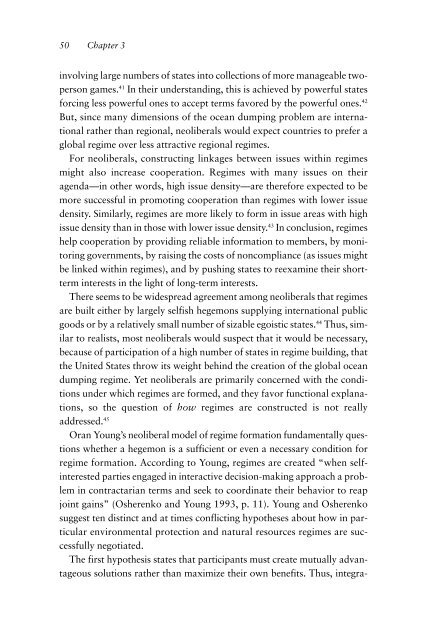Radioactive Waste Disposal at Sea: Public Ideas ... - IMO
Radioactive Waste Disposal at Sea: Public Ideas ... - IMO
Radioactive Waste Disposal at Sea: Public Ideas ... - IMO
Create successful ePaper yourself
Turn your PDF publications into a flip-book with our unique Google optimized e-Paper software.
50 Chapter 3<br />
involving large numbers of st<strong>at</strong>es into collections of more manageable twoperson<br />
games. 41 In their understanding, this is achieved by powerful st<strong>at</strong>es<br />
forcing less powerful ones to accept terms favored by the powerful ones. 42<br />
But, since many dimensions of the ocean dumping problem are intern<strong>at</strong>ional<br />
r<strong>at</strong>her than regional, neoliberals would expect countries to prefer a<br />
global regime over less <strong>at</strong>tractive regional regimes.<br />
For neoliberals, constructing linkages between issues within regimes<br />
might also increase cooper<strong>at</strong>ion. Regimes with many issues on their<br />
agenda—in other words, high issue density—are therefore expected to be<br />
more successful in promoting cooper<strong>at</strong>ion than regimes with lower issue<br />
density. Similarly, regimes are more likely to form in issue areas with high<br />
issue density than in those with lower issue density. 43 In conclusion, regimes<br />
help cooper<strong>at</strong>ion by providing reliable inform<strong>at</strong>ion to members, by monitoring<br />
governments, by raising the costs of noncompliance (as issues might<br />
be linked within regimes), and by pushing st<strong>at</strong>es to reexamine their shortterm<br />
interests in the light of long-term interests.<br />
There seems to be widespread agreement among neoliberals th<strong>at</strong> regimes<br />
are built either by largely selfish hegemons supplying intern<strong>at</strong>ional public<br />
goods or by a rel<strong>at</strong>ively small number of sizable egoistic st<strong>at</strong>es. 44 Thus, similar<br />
to realists, most neoliberals would suspect th<strong>at</strong> it would be necessary,<br />
because of particip<strong>at</strong>ion of a high number of st<strong>at</strong>es in regime building, th<strong>at</strong><br />
the United St<strong>at</strong>es throw its weight behind the cre<strong>at</strong>ion of the global ocean<br />
dumping regime. Yet neoliberals are primarily concerned with the conditions<br />
under which regimes are formed, and they favor functional explan<strong>at</strong>ions,<br />
so the question of how regimes are constructed is not really<br />
addressed. 45<br />
Oran Young’s neoliberal model of regime form<strong>at</strong>ion fundamentally questions<br />
whether a hegemon is a sufficient or even a necessary condition for<br />
regime form<strong>at</strong>ion. According to Young, regimes are cre<strong>at</strong>ed “when selfinterested<br />
parties engaged in interactive decision-making approach a problem<br />
in contractarian terms and seek to coordin<strong>at</strong>e their behavior to reap<br />
joint gains” (Osherenko and Young 1993, p. 11). Young and Osherenko<br />
suggest ten distinct and <strong>at</strong> times conflicting hypotheses about how in particular<br />
environmental protection and n<strong>at</strong>ural resources regimes are successfully<br />
negoti<strong>at</strong>ed.<br />
The first hypothesis st<strong>at</strong>es th<strong>at</strong> participants must cre<strong>at</strong>e mutually advantageous<br />
solutions r<strong>at</strong>her than maximize their own benefits. Thus, integra-

















